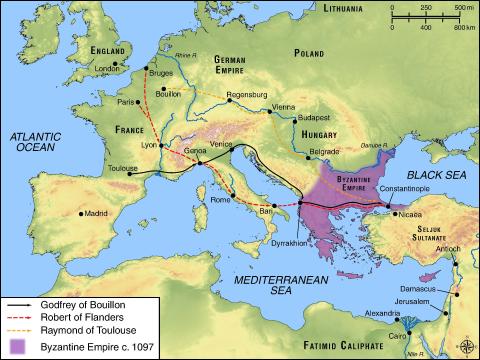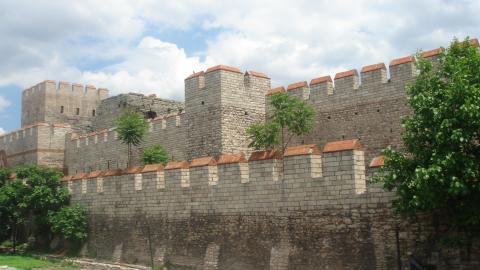Godfrey of Bouillon
[1.3.3] Dux dēnique Godēfridus prīmus omnium seniōrum Cōnstantīnopolim vēnit cum magnō exercitū, duōbus diēbus ante Dominī nostrī Nātāle, et hospitātus est extrā urbem, dōnec inīquus imperātor iussit eum hospitārī in burgō urbis. Cumque fuisset hospitātus dux, sēcūrē mittēbat armigerōs suōs per singulōs diēs, ut paleās et alia equīs necessāria asportārent. Et cum putārent exīre fīdūciāliter quō vellent, inīquus imperātor Alexius imperāvit Turcopōlīs et Pinzinacīs invādere illōs et occīdere.
[1.3.4] Balduīnus itaque, frāter ducis, haec audiēns, mīsit sē in īnsidiīs, tandemque invēnit eōs occīdentēs gentem suam, eōsque invāsit fortī animō, ac, Deō iuvante, superāvit eōs. Et apprehendēns sexāgintā ex eīs, partem occīdit, partem ducī frātrī suō praesentāvit. Quod cum audīsset imperātor, valdē īrātus est. Vidēns vērō dux inde īrātum imperātōrem, exiit cum suīs dē burgō et hospitātus est extrā urbem. Sērō autem factō, īnfēlīx imperātor iussit suīs exercitibus invādere ducem cum Chrīstī gente. Quōs dux persequēns invictus, cum Chrīstī mīlitibus, septem ex illīs occīdit, persequendō aliōs usque ad portam cīvitātis. Reversusque dux ad sua tentōria mānsit inibi per quīnque diēs, dōnec pactum iniit cum imperātōre, dīxitque illī imperātor ut trānsfretāret Brāchium Sānctī Georgīī, permīsitque eum habēre omnem mercātum ibi sīcut est Cōnstantīnopolī; et pauperibus eleemosynam ērogāre, unde potuissent vīvere.
notes
vocabulary
1.3.3
hospitor (1): be put up as guest (OLD); to camp (ML)
secūrē: safely
burgus –i, m.: fort (CL); suburb (ML)
armiger armigerī, m.: armor bearer (CL); squire (ML)
palea –ae, f.: straw (in CL usually plural).
asportō (1): to carry off
fīdūciāliter: confidently
1.3.4
tentōrium –iī, n.: tent
inibi: there, in that place
eleemosyna –ae, f.: charity, alms (LL)
ērogō (1): to pay out



